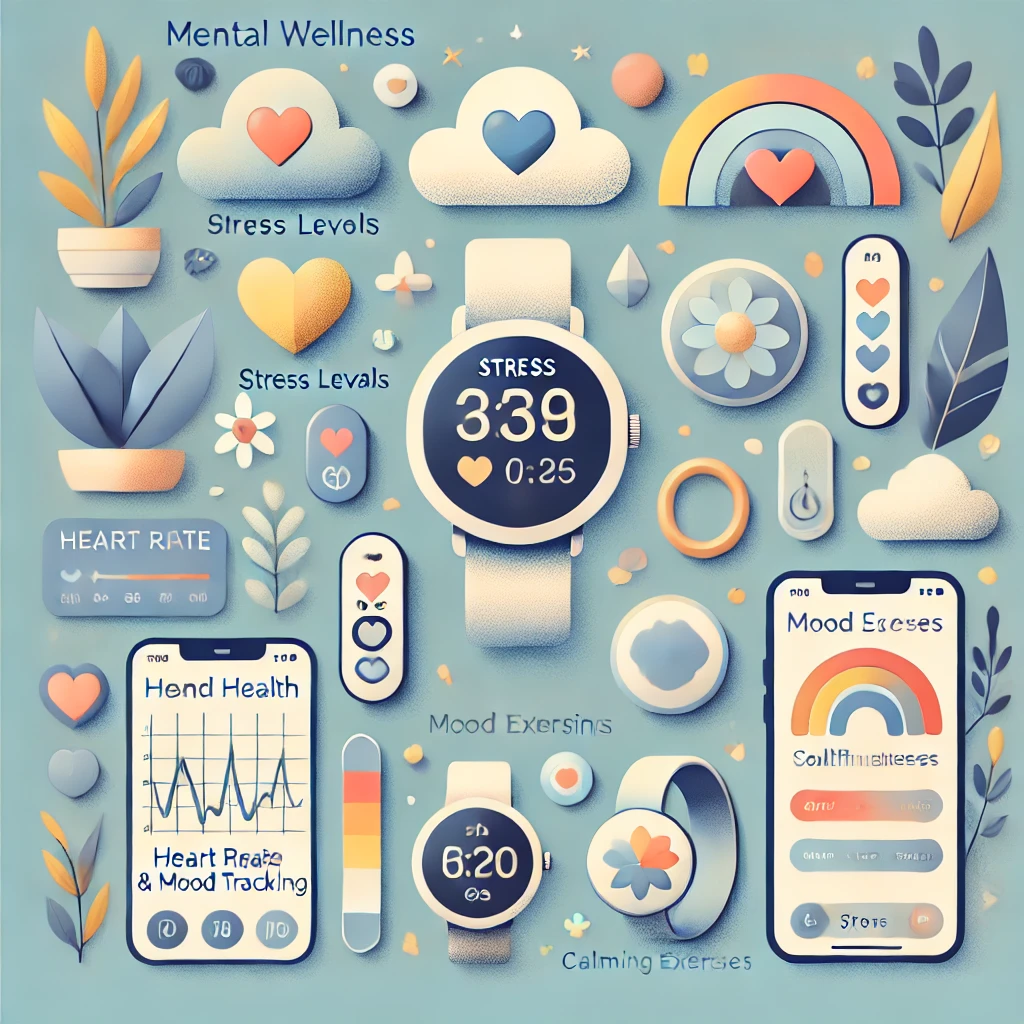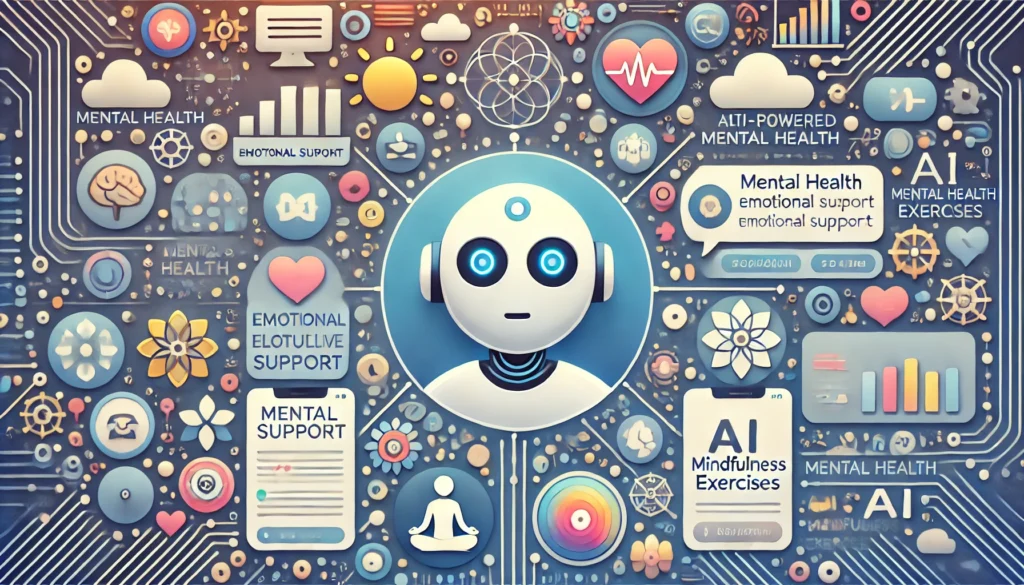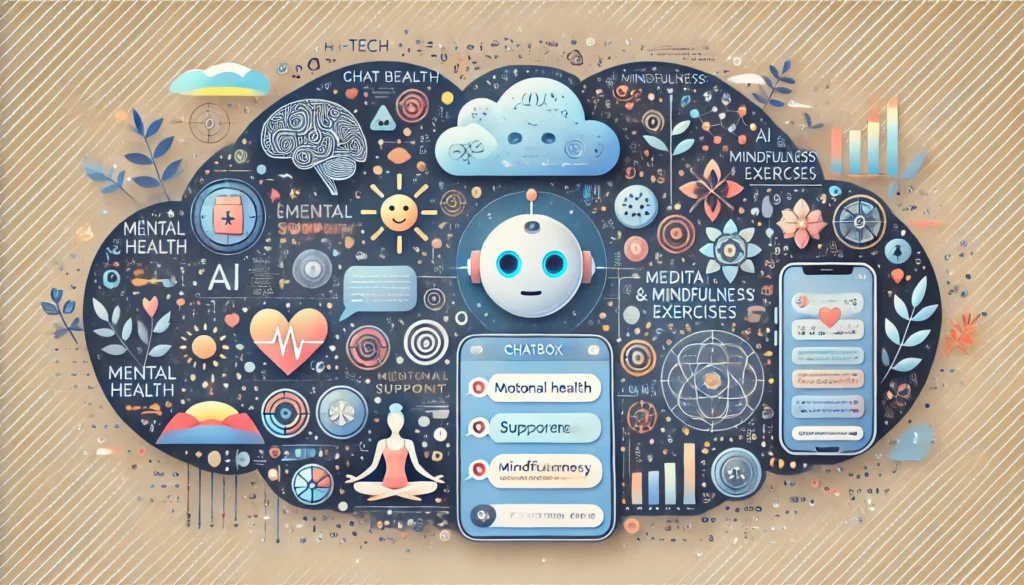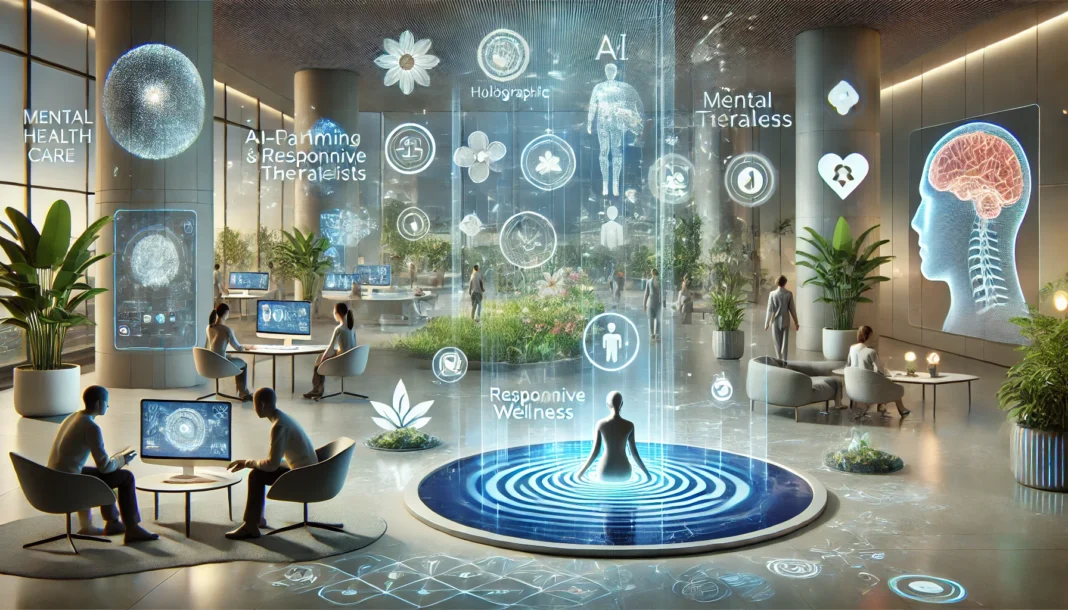Let’s be real: mental health care is changing. Gone are the days when support was limited to an office with a couch and a ticking clock. Today, digital mental health is making waves, and it’s about time. More and more, people are looking for options that go beyond traditional therapy rooms.
Digital mental health refers to the use of technology to deliver mental health services and support, such as mobile apps, virtual therapy, and AI-driven tools. These tools are growing in popularity because they meet users where they are—on their devices. It’s taking the core of mental wellness and giving it a modern twist—one that fits our tech-centric lives perfectly. Whether you’re seeking a guided meditation, a virtual therapist, or an AI-based chatbot to talk to, some options cater to different needs and preferences.
Moreover, digital mental health solutions offer flexibility that traditional methods lack. You can access them anytime, whether it’s midnight or early morning, and that convenience is a game-changer. These platforms are also helping to reduce the stigma associated with seeking mental health care, making it a more acceptable, everyday part of maintaining overall well-being. By integrating technology into mental health, we are stepping into an era where support is always within reach, literally at your fingertips.
Why Digital Solutions Are Crucial for Improving Mental Wellness
With stress and anxiety at an all-time high, digital solutions have emerged as a crucial pillar in mental wellness. Let’s face it: accessing mental health care isn’t always easy. There are long wait times, high costs, and persistent stigmas attached to traditional therapy.

However, digital tools are flipping that script, making mental wellness more accessible, affordable, and stigma-free. Not only do these tools offer convenience, but they also allow individuals to access help on their own terms. Moreover, people can seek support without fear of judgment or social pressure. They’re helping people find the support they need, when they need it, in the privacy of their own homes, anytime they want.
Furthermore, many digital mental health platforms are designed to offer immediate support, which is vital during a crisis or moments of acute stress. In addition, these tools provide users with an opportunity to work on their mental health at their own pace. For those who may not feel comfortable attending in-person sessions, these digital options are a lifesaver. They empower users to take control of their mental health without traditional barriers standing in the way. Overall, digital solutions are not just an alternative—they are quickly becoming a cornerstone of mental health care for people worldwide.
The Rise of Mental Wellness Technology
The Growing Need for Tech-Based Mental Health Solutions
It’s no coincidence that mental health innovations have exploded alongside rising global stress levels. People are demanding more accessible options, and technology is answering that call. In fact, the surge in digital solutions comes at a time when many are seeking better, more flexible ways to manage their mental health.
From AI-powered mental health apps to virtual therapy, tech is making it easier than ever to prioritize mental well-being. Additionally, the availability of digital platforms is helping to bridge the gap for those who previously faced barriers to traditional therapy. Whether it’s affordability or social stigma, these innovations are removing obstacles one by one.
Moreover, the convenience of accessing support on a smartphone or computer cannot be overstated. For many, this flexibility means getting the help they need without taking time off work or arranging childcare. Also, the variety of digital tools—from meditation apps to virtual therapy sessions—caters to diverse needs. This personalized approach is crucial, as mental health isn’t one-size-fits-all. Overall, technology has become an invaluable ally in improving mental wellness. It’s providing resources that are innovative and empathetic, understanding the unique challenges of individuals on their mental health journeys.
Digital Platforms and Apps Supporting Mental Health

Mobile Apps for Mindfulness and Meditation
Mindfulness isn’t just some woo-woo buzzword; it’s a legit approach to improving mental health. In fact, science backs up the effectiveness of mindfulness for reducing anxiety and boosting mood. Apps like Calm and Headspace make it simple for users to practice mindfulness anytime, anywhere.
Furthermore, these apps are designed to cater to all levels, from beginners to experienced practitioners. These platforms guide users through meditation, breathing exercises, and other tools that help curb anxiety and increase mental clarity. Moreover, the ease of access means users can incorporate mindfulness into their daily routines seamlessly. Whether it’s a five-minute break at work or a longer session before bedtime, the flexibility is unmatched.
Additionally, the use of soothing visuals and calming audio helps create an immersive experience that encourages relaxation. Many users find that these small, consistent mindfulness practices lead to significant long-term mental health benefits. And let’s not forget the community features—many apps include forums or group challenges that foster a sense of connection. This added social component helps users stay committed to their mindfulness journey. Ultimately, mindfulness apps are not just about meditating; they’re about empowering users to take proactive steps towards mental wellness in a busy, tech-driven world.
Telehealth Platforms for Virtual Counseling
Virtual counseling has redefined therapy. Telehealth platforms like BetterHelp and Talkspace connect users to licensed therapists without the hassle of waiting rooms or travel. Moreover, these platforms provide a wide range of therapy options to suit individual preferences.
For many, this flexibility is the difference between getting help and struggling alone. Furthermore, virtual counseling allows for more privacy, which can encourage people who might otherwise hesitate. The convenience and accessibility of virtual counseling services mean you can now get support on your terms. Whether you need help at night after a stressful day or during a lunch break, it’s available.
In addition, many platforms offer different communication methods like video calls, messaging, or phone sessions. This variety means users can choose the format that makes them feel most comfortable. Another key benefit is the reduced cost compared to traditional therapy, making it accessible for more people. Even those in remote areas, who previously had no access to mental health professionals, can now connect to therapists. Consequently, virtual counseling is breaking down geographical barriers. Overall, the flexibility, affordability, and range of options make virtual counseling a vital tool for modern mental health care.

Innovative Mental Health Technologies Transforming Care
AI-Powered Chatbots for Emotional Support
Imagine chatting with someone at 2 a.m. when anxiety strikes. In those moments, AI-powered chatbots like Woebot come to the rescue. These tools use machine learning to provide real-time emotional support.
Moreover, they are available whenever you need them, without any judgment. They can analyze your responses and offer personalized suggestions. While they’re not a replacement for professional care, they’re an excellent stopgap. They help bridge the gap until you can access a therapist. Additionally, these chatbots offer insights that help you understand your feelings better. They also suggest coping techniques that are easy to implement.
Furthermore, they act as a virtual shoulder to lean on, providing comfort when you need it most. The fact that they are available 24/7 means there is always someone—or something—ready to listen. Many users appreciate that these chatbots make mental health support more approachable. They reduce the intimidation factor that sometimes comes with seeking professional help. Even though they are not human, their empathetic responses make them feel almost like real companions. Ultimately, AI chatbots like Woebot provide timely support, help users manage difficult emotions, and make mental health care more accessible to all.
Wearable Devices for Tracking Mental Well-Being
Wearables aren’t just for counting steps anymore. These devices have evolved significantly in recent years. Devices like Apple Watch and Fitbit are now monitoring stress levels and sleep patterns—key indicators of mental health.
Moreover, many wearables can track heart rate variability, giving even more insight into your stress responses. With these insights at your fingertips, it’s easier to understand your emotional ebbs and flows and make proactive changes to your routine. Additionally, wearables can provide reminders to practice mindfulness or take a few minutes to breathe deeply. This real-time feedback helps you manage stress before it escalates into something more serious.
Furthermore, the data collected over time can show trends, allowing you to recognize patterns in your mental health. By knowing when you are most stressed or when your sleep is disrupted, you can take steps to address those issues. Also, some wearables are beginning to integrate features that connect you with mental health resources, like mindfulness exercises or quick check-ins. The convenience of having this support on your wrist makes it easier to take small but impactful steps toward better mental well-being. Overall, wearables are becoming powerful allies in monitoring and improving mental health.
Benefits of Using Digital Mental Health Tools
Digital mental health tools bring a lot to the table. They offer anonymity, flexibility, and a wide range of options. Whether it’s self-guided help through a meditation app or real-time therapy from a licensed counselor, these tools have something for everyone.
Moreover, they break down barriers that often stop people from seeking help, like high costs and limited accessibility. For many, these barriers can make seeking support feel impossible. However, digital tools are flipping the narrative, making mental health support more approachable and available. Additionally, the flexibility of these solutions is unmatched. Users can access support at any time, whether they need it in the middle of the night or during a lunch break. This convenience means that no one has to wait for traditional office hours.
Furthermore, these tools are often more affordable compared to in-person therapy sessions, making them accessible to those who may struggle with high costs. Another key advantage is privacy. Many people hesitate to seek help due to fear of judgment, but digital tools offer complete discretion. You can use these apps without anyone knowing, which encourages more individuals to take that first step towards improving their mental health. Ultimately, digital mental health tools are changing the game by offering a practical, flexible, and private way to seek the support people need, whenever and wherever they need it.

Challenges and Limitations of Digital Mental Wellness Solutions
Data Privacy Concerns in Mental Health Apps
Here’s the catch: digital tools aren’t without issues. One major concern is data privacy. Mental health data is deeply personal, and ensuring it remains secure is non-negotiable.
Moreover, data breaches can have serious consequences, potentially exposing users’ private struggles. While most apps promise confidentiality, it’s crucial for users to read the fine print and understand how their data is used. Additionally, companies may share data with third parties, even if anonymized, which raises ethical questions.
Furthermore, many users are not fully aware of the permissions they grant these apps. This lack of awareness can lead to unintended data sharing, making privacy a serious concern. On top of that, some platforms may not use sufficient encryption methods, putting data at risk. It’s also important to consider that data regulations differ across countries, meaning protections might vary. Therefore, users must be diligent and informed before using these digital mental health tools. Reviewing privacy policies, opting for tools with strong encryption, and being cautious about what personal information is shared are key steps. Ultimately, while digital tools offer great benefits, understanding and mitigating privacy risks is essential for safeguarding personal mental health information.
Accessibility and Affordability of Digital Tools
While digital mental health tools are more accessible than many traditional forms of therapy, they still come with barriers. First, not everyone has access to smartphones or high-speed internet, which limits their reach significantly. Moreover, those living in rural or underserved areas may find these technological requirements particularly challenging.
Additionally, the cost of data plans can be another hurdle for some users. And while many apps are free, some of the best features require subscriptions—leaving certain groups at a disadvantage. This subscription model can be a major barrier for those who need more advanced features but cannot afford them. Furthermore, the complexity of using certain digital tools can be daunting for those who are not tech-savvy. This lack of digital literacy can prevent people from fully benefiting from these mental health solutions.
Moreover, language barriers also play a role, as many apps are available only in a limited number of languages. Consequently, a significant number of people are excluded from accessing these helpful tools. Therefore, despite their advantages, digital mental health tools still need to address these accessibility and affordability issues to ensure equitable support for all individuals seeking mental wellness.
Popular Digital Tools for Stress, Anxiety, and Emotional Health

Apps and Platforms Leading the Charge
Some of the best digital tools to manage stress and anxiety include platforms like BetterHelp, Calm, and Headspace. Each offers unique features—BetterHelp connects users with counselors, while Calm and Headspace focus on self-guided mindfulness techniques to keep anxiety at bay.
Moreover, BetterHelp provides a variety of communication options, including video, phone, and text-based counseling. This flexibility allows users to find what works best for their needs and comfort levels. Calm, on the other hand, excels in providing relaxation tools, including sleep stories, guided breathing exercises, and soundscapes designed to ease anxiety. Additionally, Headspace focuses on building mindfulness skills through structured meditation courses.
These platforms help users regain control by creating routines that foster healthier mental habits. Furthermore, all three platforms offer user-friendly interfaces, which make them accessible to individuals of all ages and technical abilities. They also provide daily reminders to encourage consistency, which is crucial in building long-term mental resilience. In addition, they include features like progress tracking, which allows users to reflect on their mental health journey. Ultimately, these platforms are designed not just for temporary relief but for sustainable, long-term improvement in mental well-being. By using these tools, individuals can take proactive steps to manage stress and anxiety effectively.
The Role of AI and Virtual Support in Mental Health
Chatbots as Virtual Mental Health Coaches
Chatbots are more than just digital friends—they’re becoming virtual coaches. Tools like Wysa use AI to help users work through problems, offering a blend of CBT techniques, positive reinforcement, and calming exercises. Moreover, these chatbots are accessible at any time, making them incredibly convenient.
They’re great for those moments when you need immediate support, and they’re available 24/7. Additionally, their constant availability means you never have to feel alone during tough times. Many users appreciate how these chatbots can provide a sense of comfort when human help isn’t available.
Furthermore, the AI used in these chatbots continuously learns from user interactions. This allows them to offer more personalized responses over time. They can detect patterns in a user’s emotional state and provide specific suggestions to address those feelings. Whether it’s recommending breathing exercises or guiding you through cognitive restructuring, these tools are helpful. Also, the anonymity they provide makes it easier for people to open up about sensitive topics. Unlike speaking to another person, there’s no fear of judgment or misunderstanding. Ultimately, chatbots like Wysa are bridging the gap in mental health care. They’re offering immediate, empathetic, and personalized support that helps individuals manage their emotional well-being effectively.
AI-Driven Insights for Personalized Mental Health Recommendations
AI doesn’t just talk—it listens. By analyzing user data, AI-driven platforms can offer personalized recommendations, guiding users toward healthier habits. Furthermore, these platforms consider various aspects like sleep patterns, stress levels, and activity history. This allows them to create specific and effective suggestions that fit individual needs.
Moreover, AI can detect shifts in mood or behavior, providing timely interventions when needed. For example, if it notices increased signs of stress, it may suggest a mindfulness exercise or breathing techniques. Additionally, these platforms can adjust recommendations based on user feedback, making support even more personalized over time. This adaptability ensures that individuals receive care that evolves with them.
In contrast to generic advice, AI’s tailored approach is much more impactful. It acknowledges that each person’s mental health journey is unique and requires a customized strategy. Another key aspect is how AI integrates with wearable devices to enhance its effectiveness. By combining data from various sources, AI creates a holistic view of mental well-being. Ultimately, this type of tailored support can make all the difference, helping individuals take proactive steps toward improved mental health.
Future Trends in Mental Health Innovations
The future is bright for digital mental health. Emerging trends include deeper integration of AI in personalized mental health, virtual reality (VR) experiences for exposure therapy, and even greater access to mental health resources via 5G technology.
Moreover, AI will likely become even more sophisticated, making personalized mental health care highly precise. For example, AI algorithms may soon predict emotional downturns before they happen, allowing for timely intervention. In addition, VR is expected to revolutionize therapy by providing immersive environments that help people confront fears safely. Exposure therapy through VR can make difficult treatments more accessible and engaging.
Furthermore, 5G technology will enhance real-time support, reducing delays in virtual counseling and AI chatbot responses. This speed will make it easier for users to get immediate help when they need it most. Additionally, there will be increased development in wearable technology that integrates seamlessly with mental health platforms. These wearables will provide even more detailed insights, from real-time stress tracking to automatic mood logging. Ultimately, we’re heading toward an era where mental health tools are more effective, accessible, and personalized than ever before. The combination of these innovations will significantly improve how individuals manage their mental well-being, providing support that evolves with their unique needs.
FAQs about Mental Health
What are digital mental health solutions?
How do mental health apps work to support well-being?
What are some of the best apps for mindfulness and mental wellness?
How can AI be used in mental health care?
Are mental health apps effective in treating anxiety and depression?
What is teletherapy, and how does it work?
Can digital mental health tools replace traditional therapy?
What is Cognitive Behavioral Therapy (CBT), and how do apps incorporate it?
Are there digital solutions for crisis management in mental health?
How do I choose the right mental health app for my needs?
Wrapping Up
Digital mental health is here to stay, and it’s only getting better. With AI chatbots, wearable tracking, and telehealth services, mental wellness is now within reach for more people than ever before. The future of mental health is digital, and it’s empowering individuals to take control, find support, and live healthier, happier lives—all at the touch of a button.

